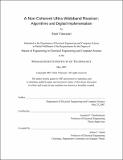A non-coherent ultra-wideband receiver : algorithms and digital implementation
Author(s)
Vitavasiri, Sinit
DownloadFull printable version (572.6Kb)
Alternative title
Non-coherent UWB receiver : algorithms and digital implementation
Other Contributors
Massachusetts Institute of Technology. Dept. of Electrical Engineering and Computer Science.
Advisor
Anantha P. Chandrakasan.
Terms of use
Metadata
Show full item recordAbstract
Ultra-wideband (UWB) communication is an emerging technique for wireless transmission in the 3.1-10.6 GHz unlicensed band with signal bandwidths of 500 MHz or greater. A non-coherent receiver based on energy collection reduces complexity, cost, and power consumption at the cost of channel spectral efficiency. The receiver collects the signal energy in two time windows and determines the transmitted bits based on which window has greater energy. This thesis explains the implementation of low-complexity detection, synchronization, and decoding algorithms for a non-coherent ultra-wideband receiver. The receiver is modeled in MATLAB to measure performance. The UWB receiver performs effectively in noisy channels. At the signal-to-noise ratio (SNR) of 0 dB, the receiver achieves a detection miss rate of 2.1% and a false alarm rate of 1.2%. The synchronization error (within ±2 chip periods) rate is 0.5%. The bit error rate is 8.6%, but it drops sharply to 0.1% at an SNR of 5 dB. Moreover, the detection and the synchronization processes take 19.72 p.s and 22.53 pts, respectively. The digital system is implemented in Verilog, which is mapped to hardware (FPGA). In the final system, a radio frequency and an analog front-end interface with the FPGA, resulting in a complete radio receiver.
Description
Thesis (M. Eng.)--Massachusetts Institute of Technology, Dept. of Electrical Engineering and Computer Science, 2007. This electronic version was submitted by the student author. The certified thesis is available in the Institute Archives and Special Collections. Includes bibliographical references (leaves 119-121).
Date issued
2007Department
Massachusetts Institute of Technology. Department of Electrical Engineering and Computer SciencePublisher
Massachusetts Institute of Technology
Keywords
Electrical Engineering and Computer Science.